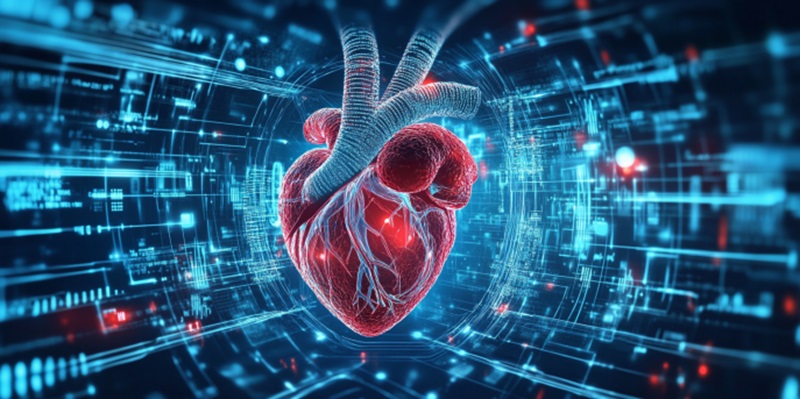Cardiovascular diseases, particularly arrhythmias and heart strokes, continue to pose significant health risks, often going unnoticed until it’s too late. Early detection is critical for effective treatment and better patient outcomes. Recent advancements in artificial intelligence (AI) are showing promise in enhancing the diagnosis and detection of these conditions. A novel study has introduced a promising model called Reservoir Computing, which focuses on identifying irregularities in electrocardiogram (ECG) signals. This model stands out for its ability to predict heart activity accurately while using minimal data, presenting advantages over traditional neural networks. Researchers trained their model on the widely used MIT-BIH Arrhythmia Database, indicating its potential for quick signal predictions in real-time settings. Electrocardiograms are essential tools for monitoring cardiac health, yet the complexity of heart signals can make analysis challenging. Recent approaches have integrated AI techniques to classify and filter out noise in ECG readings. Notably, the combination of algorithms such as Support Vector Machines and K-Nearest Neighbors has yielded impressive accuracy rates, even reaching 99% in some instances.
The Promise of Artificial Intelligence in Cardiac Care
As the healthcare industry continues to evolve, the application of AI models like Reservoir Computing promises to reshape how cardiac conditions are diagnosed and managed. This progress could lead to the development of advanced medical devices that provide real-time monitoring of heart conditions, ultimately improving patient care. Traditional methods of ECG analysis involve manual interpretation by trained medical professionals, which can be time-consuming and prone to human error. AI models, however, streamline this process by quickly analyzing large sets of data with higher accuracy. By reducing the time needed for diagnosis, physicians can make quicker, more informed decisions regarding patient care.
The adoption of AI in cardiac care also holds great potential for remote monitoring and telemedicine. Patients with preexisting heart conditions can benefit from continuous and real-time monitoring, with AI systems prompting timely interventions when irregularities are detected. This ability for remote monitoring is particularly beneficial during the ongoing COVID-19 pandemic, where minimizing in-person visits is crucial. AI-enabled devices can alert physicians to potential issues before they become life-threatening, thus playing a pivotal role in preventive care. As AI continues to advance, it becomes imperative for healthcare providers to stay updated and integrate these technologies into their practice.
Integrating Healthy Habits with AI Technology
While AI offers groundbreaking advancements in diagnosing heart conditions, it should not be seen as a standalone solution. Incorporating healthy lifestyle habits is essential for maintaining cardiovascular well-being. Regular check-ups and monitoring can help detect potential issues early, and investing in quality blood pressure monitors and smart wearables that track heart rate can provide useful data for both patients and physicians. These tools bring visibility to one’s heart health, allowing for early identification and management of irregularities.
A balanced diet plays a pivotal role in heart health. Foods rich in omega-3 fatty acids, such as salmon and walnuts, coupled with high-fiber foods like fruits, vegetables, and whole grains, are beneficial. Limiting salt and saturated fats can significantly lower the risk of heart disease. Additionally, maintaining regular physical activity is crucial. The American Heart Association recommends at least 150 minutes of moderate aerobic exercise per week. Simple changes like taking the stairs instead of the elevator or walking during lunch breaks can cumulatively improve cardiovascular health.
Managing stress and ensuring ample sleep also contribute significantly to heart health. Stress has been linked to adverse cardiovascular outcomes, so employing relaxation techniques like yoga, meditation, and deep-breathing exercises can be beneficial. Sleep should not be overlooked; poor sleep habits are associated with a higher risk of cardiovascular issues. Striving for 7-9 hours of quality sleep each night is recommended. Creating a bedtime routine and optimizing the sleep environment can help achieve this goal.
A Synergistic Approach for a Healthier Future
Cardiovascular diseases, particularly arrhythmias and heart strokes, remain significant health threats, often undetected until it’s too late for effective intervention. Early detection is crucial for improving treatment outcomes. Recent progress in artificial intelligence (AI) offers promise in enhancing the diagnosis and detection of these conditions. A novel study has unveiled a promising model called Reservoir Computing, designed to detect irregularities in electrocardiogram (ECG) signals. This model excels in predicting heart activity accurately with minimal data, surpassing traditional neural networks. Researchers validated their model using the MIT-BIH Arrhythmia Database, showcasing its potential for rapid, real-time signal predictions. Electrocardiograms are vital for cardiac monitoring, yet the complexity of heart signals can complicate analysis. Recent AI advancements have been employed to classify and filter out noise in ECG readings. Notably, algorithm combinations like Support Vector Machines and K-Nearest Neighbors have achieved remarkable accuracy rates, reaching as high as 99% in some cases.

